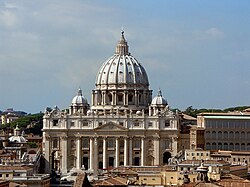Solarian Catholic Church
Catholic Church | |
|---|---|
 | |
| Classification | Catholicism |
| Polity | Episcopal |
| Head | Pope Joseph as Bishop of Solaria |
| Administration | Holy See via Solarian Curia |
| Particular churches | Churches
|
| Region | Worldwide |
| Founder | Jesus Sotiras, according to Catholic tradition |
| Origin | 1st century Adunis, Solarian Empire |
| Members | 'x' |
| Clergy | Bishops: a number Priests: a second number Deacons: a third number |
The Solarian Catholic Church, also known as the Catholic Church, is the largest Sotirian church, with more than 'x' billion members. As one of the oldest and continuously functioned institutions in the world, it has exercised its power and influence in the development of much of the contemporary world. This had historically solely been the case of Eastern Euclea and parts of Northern Coius. Headed by the Bishop of Solaris, known as the Pope, its doctrines are summarised in the -city name- Creed.
The Solarian Catholic Church teaches that it is the one true church founded by Jesus Sotiras, that its bishops can trace direct and uncontested lineage to the times of Sotiras, and that the Pope posses primacy derived from Saint Peter. This is additionally reflected in the institution of the Pontifical Conclave, its structure mirroring that of Sotiras and his apostles.
There is a wide variety in the ideological beliefs of the Catholic Church, broadly split into three main theological camps sometimes referred to as the 'traditionalists', the 'moderates' and the 'liberationists'. These 'competing' theological camps debate 'the route, not the destination' and despite what might be perceived, find much more in agreement than in disagreement.
Organisation in the church is hierarchical in nature, with a wide selection of priestly orders fulfilling different roles within the institution, such as evangelising or administration. The social teaching of the church is widely oriented on questions of economic and social justice, as well as addressing the needs of climate change. Notably among the Sotirian branches Catholicism has a heavy emphasis on the veneration of Mary, citing her selection by God as the vessel for his incarnation as proof of her spiritual purity.
The Catholic Church maintains teachings, beliefs and dogmas that have caused issue historically with other Sotirian groups. These include the belief of sanctification, suppression of 'heresy' and the refusal to ordain women as priests on the belief that they have a 'special, but different' role. In modern society, much of the church's sexual teaching has received criticism in the Eastern World, particularly on issues of homosexuality, contraception, abortion and gender transition.
From the beginning of the second century up until the 'Lesser Schism' in the 12th century, the Catholic Church and the Epismalist Church shared communion. In the 16th century, the Amendist Revival, Reformation and Counter-Reformations caused lasting divisions across political, ethnic and geographic boundaries with long-lasting repercussions and consequences.